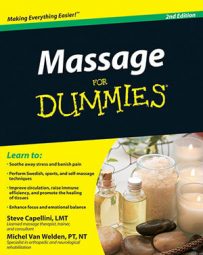Contraindications (conditions that make massage unadvisable) can bring down a great massage for both you and the recipient. If you are aware of the contraindications pertaining to massage, you’ll be a much safer massager and/or recipient.
Following are the contraindications for massage:
Fever or infectious diseases: When you have a fever or infectious disease, your body is trying to isolate and expel an invader of some kind. Massage increases overall circulation and can therefore work against your body’s natural defenses. Plus, it exposes the massage giver to the virus as well.
Inflammation: Massage can irritate inflamed conditions including anything that ends in -itis, such as phlebitis (inflammation of a vein), dermatitis (inflammation of the skin), arthritis (inflammation of the joints), and so on.
High blood pressure: High blood pressure means excessive pressure against blood vessel walls. Massage affects the blood vessels, so people with high blood pressure or a heart condition should receive light, sedating massages and check with their physicians to see whether they can receive more vigorous massage.
Hernia: Hernias are protrusions of part of an organ (such as the intestines) through a muscular wall. They should be dealt with by trained medical professionals.
Osteoporosis: Elderly people with a severe stoop to the shoulders often have this condition, in which bones become porous, brittle, and fragile. Massage may be too intense for this condition.
Varicose veins: Massaging directly over varicose veins can worsen the problem. However, applying a very light massage next to the veins in question, always in a direction toward the heart, can be beneficial.
Skin problems: Avoid anything that looks like it shouldn’t be there, such as rashes, wounds, bruises, burns, boils, and blisters. These problems are usually local, however, so you can still massage in other areas.
Cancer: Massage increases lymphatic circulation, and cancer can spread through the lymphatic system, so massage may potentially spread the disease. Simple, caring touch is fine, but massage strokes that stimulate circulation usually aren’t recommended. Always check with a doctor first.
HIV infection: HIV isn’t contraindicated itself — it can’t be transmitted during massage if there’s no exchange of bodily fluids. However, some of the infections that people suffering from the later stages of AIDS experience are contraindicated, and you should avoid those infections.
Pregnancy: Most women love to receive massage during pregnancy, and giving them one is perfectly fine as long as you educate yourself on a few special precautions.

